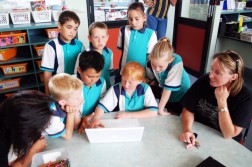It’s easy to be cynical about an initiative like the 2020 Summit. In 1983, people quipped: "What is a Summit? Any meeting attended by Bob Hawke." Today they worry: "The Prime Minister will now be able to do anything he likes – and say that he got support for it at the Summit."
Sometimes, though, it pays to take a longer view.
Australia really was an industrial graveyard back in 1983, when Hawke called his economic summit. And those talks did help to prepare the nation for the huge changes that came shortly afterwards. Floating the dollar, cutting tariffs without matching cuts from our trading partners – these were the decisions that modernised Australia.
But big changes like those need preparation. Gough Whitlam learnt that lesson in his second 18-month term, after he suddenly announced a 25 per cent cut in all Australian tariffs. Voters never forgave him.
Some comfortable, middle-class voters might think that
crises don’t occur when Labor governments come to power. Sadly, they do.
It’s too early to say just yet what changes we can expect from the 2020 Summit, but a 45 page "initial report", delivered just an hour after the Summit ended, gives some important clues.
The Summit put the issue of a Republic back on the national agenda. News Ltd boss John Hartigan suggested a two step transition: a referendum on whether Australians want a republic, then, if they do, another on what kind of republic it should be. But even among Rudd’s ministers there is no consensus on this. His Deputy, Julia Gillard, regards the issue as urgent. But Foreign Minister Stephen Smith believes we should wait, politely, until the Queen vacates her present position. Smith wasn’t so undiplomatic as to say something like: "No hurry, Your Maj, hang about as long as you like," but those thoughts are implicit in the stand he took.
The summiteers also recommend: equipping all Australians with world leading education and training; overcoming the public private divide in education; teaming non-Indigenous schools with those teaching Aboriginal children, in sister school relationships; a clean sheet review of Federal-State responsibilities for roads; a soil and hydrological study of Northern Australia; a national preventative health agency; 30 minutes exercise every day for sedentary workers; and a rights-based labour mobility program for Pacific Islanders.
That last item is something public servants would never have raised in the time of the previous prime minister, John Howard.
Debate at the Summit wasn’t all high level, expert talk. A tax expert who took part in discussions on the economy admitted to being "appalled" at the low level of discussion in that group on taxation. "Some were talking about flat tax taxes and moving to a greater reliance on consumption taxes," the participant told newmatilda.com on condition of confidentiality.
The list above is far from exhaustive. Many other good – and not so good – ideas were raised at and before the summit.
The non-starters include the construction of a transcontinental railway across Northern Australia, and the abolition of the States. Admittedly, Kevin Rudd might be tempted by the second suggestion, but no serious politician would ever give it more than a passing thought.
Rudd left the 1002 participants in no doubt, though, that the way Australia is governed needs fixing. He said as much in his closing declaration.
Rudd’s position seemed strangely similar to that of the school master, in François Truffaut’s famous French film, The 400 Blows, which by sheer coincidence was playing in Canberra over the weekend. In a key scene, set in Paris in 1958, the school teacher, – looking at a particularly recalcitrant student – asks in despair: "Where will we all be in 10 years?" by which time this student would be an adult.
No, that student was not Daniel Cohn-Bendt, better known as "Danny the Red", who led the student riots that engulfed Paris in 1968, but he might well have been.
Any country wishing to avoid civil strife in demanding times, needs to plan. And that, essentially, is what the 2020 Summit was meant to do for Australia.
So was the Summit a success? From Kevin Rudd’s viewpoint, yes. It backed his now clear plan to
tidy up the way Australia is governed. This country’s Federal system doesn’t just lead to expensive and wasteful duplication. Try quadruplication, double it, then add
one — and you’ll get some idea of what happens when you have six State
bureaucracies, two Territory administrations plus one, overarching, national
system, all heavily populated with little feifdoms.
But will the 2020 Summit benefit the nation? That question is probably best examined negatively.
About the worst thing
Australians could do, in this rapidly changing world, is to stop talking and retreat
to entrenched positions. Even if the Summit did no more than get Australians
together, in a mutually re-enforcing venue, and get us all talking about what
should be done, it must be rated a success.
Donate To New Matilda
New Matilda is a small, independent media outlet. We survive through reader contributions, and never losing a lawsuit. If you got something from this article, giving something back helps us to continue speaking truth to power. Every little bit counts.



